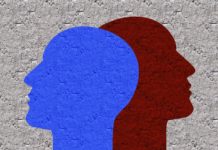Psychiatrist Says: More Psychiatry Means More Shootings
Psychiatry not only increases the risk of violence by giving violence-inducing drugs, it lulls patients, families, professionals, schools and the public into an unrealistic and even disastrous sense of security. It's an irony of tragic proportions: Cruz was left unsupervised and free to buy a gun because he was faithfully taking psychiatric drugs that can cause violence.
Study Explores Meanings of Bipolar Disorder to Those Diagnosed
The narratives about Bipolar Disorder promoted by drug companies may influence how those diagnosed understand themselves.
Promoting Healing After Psychosis
It makes sense to be cautious about any kind of exploratory practice that might send someone who has been "psychotic" into another period of being lost and confused. But we should also beware the risk of trying to be too stable and "normal" after psychosis — the risk of avoiding the transformative work that might need to happen for that person.
Challenging the New Hype About Antidepressants
The extraordinary media hype over the latest meta-analysis of antidepressants puts the discussion of these drugs back years. Despite the fact that rates of prescribing have doubled over the last decade, the authors of the analysis are calling for yet more prescribing. But this latest meta-analysis simply repeats the errors of previous analyses.
Dr. Pies Defending Psychiatry’s Position on Auditory Hallucinations
On September 4, 2017, psychiatrist Ronald Pies published an article titled: "Hearing Voices and Psychiatry’s (Real) Medical Model." Let's take a look at the six fundamental assumptions that the eminent and scholarly Dr. Pies assures us "underlie the model most psychiatrists actually use in their clinical work."
Race and Class Affect Teacher Perceptions of ADHD Medication Use
Study uncovers teachers’ attitudes surrounding ADHD medication use and examines the influence of race and social class on teacher beliefs.
Taking Big Pharma to Court: Why Lawsuits Have Little Effect on Drug Companies
2018 has already brought particular attention to the pharmaceutical industry’s “profit over patient” mentality, as drug manufacturers and distributors continue to be hit with civil cases throughout the country for their involvement in the opioid epidemic. But the sad fact is that these lawsuits are nothing new.
Mindfulness and Self-Compassion Interventions Target Depressive Symptoms
A new study finds self-coldness predicts depressive symptoms and supports self-compassion as a buffer.
A Mother’s Worst Nightmare Continues
Marci Webber is a single mom who experienced a medication-induced psychotic episode, during which she killed her daughter, believing it would "save" her, and then tried to kill herself. For over seven years now, Marci and I have been trying unsuccessfully to get the mental health system and judicial system to acknowledge the true cause of her crime and let her go.
The Scientism of Attention Deficit Hyperactivity Disorder (ADHD)
Calling ADHD a diagnosis, i.e., something with the capacity to explain the behaviours that it describes, is like saying the headache is causing the pain in my head or the inattention is caused by inattention. Scientism has turned ADHD from a vague, difficult to pin down concept into a fact of culture masquerading as a fact of nature.
Study Confirms Higher Suicide Risk for Sexual Minority Adolescents
Researchers report that sexual minority adolescents have considered, planned, and attempted suicide substantially more than their heterosexual peers.
Psychiatry’s War on Free Will
Psychiatry’s main role was always to forcibly negate the free will of society’s outliers. Its methods included forced removal, confinement, and electrical, surgical, and chemical lobotomy. But then it sought to lure non-outliers into willingly allowing psychiatry to negate their free will, too. So it devised ways to trick people into "lobotomizing" themselves.
Michael Fontaine: What the Ancient World Can Teach Us About Emotional Distress
An interview with Professor of classical languages and literature, Michael Fontaine. Michael is Associate Vice Provost of Undergraduate Education at Cornell University in New York. We discuss what Ancient Greece and Rome can teach us about psychiatry and the concept of mental disorders.
I Used to Be Psychotic and Then I Heard a Voice Again
When I heard a voice speak to me last week, I was experiencing a response to significant events — the voice was a way for my mind to intentionally contain a confusing personal event or experience. As a professional, I am grateful for the powerful reminder that hearing voices is something to embrace and support, which includes putting aside my own prejudices.
Why Should Suicide (Or Voluntary Death) Be a Civil Right?
Regardless of what one's moral stance is on the value of life, or the meaning of death, it is time to recognize that there are people whose views differ from ours, and that we do not have the right to force them to live (and die) the way we want to. We all die; it's the journey that matters, not the destination.
Psychiatry’s Failure to Acknowledge Who I Really Am
This is not how the mental health system should treat "psychotic" people. Mental health providers should treat them with compassion, empathy, respect, love and understanding. With a circle of loving and understanding people surrounding a person in crisis, I have no doubt that most "psychosis" would normalize in time.
Confirmed: Las Vegas Shooter on Benzos
A Las Vegas newspaper has released the autopsy blood toxicology report for Stephen Paddock. Three metabolites (breakdown products) of Valium were found in his blood: nordiazepam, oxazepam, and temazepam. Paddock’s autopsy report confirms he was a regular user of Valium, at least in the days leading up to the shootings.
Researchers Challenge Industry-Friendly Depression Guideline
Review of a new mixed depression guideline reveals financial bias of guideline developers and lack of evidence supporting recommendations for prescribing of antipsychotics.
Spending on Social Services Improves Health Outcomes
Canadian study finds that social service spending is associated with a decrease in mortality and increase in life expectancy.
Who Gets to Define “Peer Support?”
The definition of “peer support” should be straightforward. But over the years, “peer support” seems to have morphed into “peer specialist” — or, to put it more bluntly, psychiatric survivors’ experiential knowledge has been co-opted by the system. How does peer-developed peer support differ from the peer staff model? And what can we do about this?
Seeking Justice
My life flashed before my eyes as my entire medical history over the last decade was rewritten from having a genetic brain disease to being a victim of a medical scam. It was bittersweet, for I realized that I was not sick and dying, but I had been robbed of so many years of my life due to the psychiatrist’s lies. Now I am suing my former psychiatrist for damages.
Multisystemic Therapy No More Effective than Standard Care for Antisocial Behavior
Study counters previous evidence supporting multisystemic therapy, finding adolescents are just as likely to have out-of-home placements when receiving multisystemic therapy versus management as usual.
Reflections on the Torture Parents and the Pedophile Olympic Doctor
Parents should be very cautious about entrusting their children to any institution — private boarding schools, ballet schools, training facilities away from home. We are all best off raising our adolescents subject to our oversight, rather than entrusting them to others. Those who should protect us from trauma are harming our children.
Study Finds Heavy Metal Music Beneficial to Mental Health
A new study highlights the role heavy metal music plays in the mental health of adolescents facing adversity.
What Would a Truly Integrated System of Care Look Like?
Imagine that you were the director of a health insurance company and you had just agreed to provide health coverage to several hundred thousand people and you will have to fund health care including mental health and alcohol/drug care too. The purpose of this blog is to show the kind of system you would have to design.

































